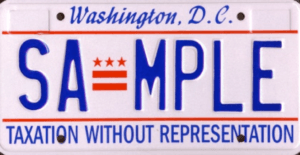 If you visit Washington, DC, one of the things you may notice is the license plates on local vehicles.
If you visit Washington, DC, one of the things you may notice is the license plates on local vehicles.
While the inhabitants of the District of Columbia pay federal taxes, they do not have voting representation in Congress – just one delegate whose votes do not count. So since 2000, after approval by the Mayor and City Council, DC residents have had a choice to use their license plates as a form of protest. “Taxation Without Representation” harkens back to the causes of the Revolutionary War and the principles under which it was fought.
The creation of a federal district was outlined in the Constitution, Article I, Clause 17 which allows Congress “To exercise exclusive Legislation in all Cases whatsoever, over such District (not exceeding ten Miles square) as may, by Cession of particular States, and the Acceptance of Congress, become the Seat of the Government of the United States, and to exercise like Authority over all Places purchased by the Consent of the Legislature of the State in which the Same shall be…” This allowed Congress to create a federal district over which they had power as it would not be part of a state.
As Washington, DC has grown, so has the frustration of its population. Its citizens were not allowed the right to vote in the Presidential election until the passage of the 23rdAmendment in 1961 which gave the District three Electoral Votes for President. But still, they have no voting representation in Congress.
Activists in Washington, DC are now trying to get the city approved as the 51st state. With a population (estimated at 693,000 in 2017) greater than Vermont or Wyoming, its residents argue that they deserve two Senators and a Representative as much as any states are entitled to them. They argue that the residents pay taxes, serve in the military and contribute to the welfare of the nation as a whole, so they should be entitled to the same rights.
Those who oppose Washington, DC becoming a state explain that there was a reason that the framers of the Constitution did not want the federal district to gain too much power. In Federalist #431, one of the authors of the Constitution and future President James Madison, explained that if the capital were in a state, that state would have too much power as members of Congress would be beholden to it as part-time residents. However, Madison also writes that while not part of a state, the federal district’s citizens “will have had their voice in the election of the government which is to exercise authority over them.” This part of Federalist #43 is used by supporters of DC having representation in Congress to show that it wasn’t the intent for them to be disenfranchised.
In the election of November, 2016, DC voters overwhelmingly approved a referendum to make Washington the nation’s 51st state.2 To get around the Constitutional requirement that the federal district be under the control of Congress, the referendum carved out the area of the city with the White House, Congress and many of the federal departments as “federal district.” But the rest of the city would become the state of “New Columbia” with two Senators and a Representative. The referendum passed with over 78% of the vote.3
While she can’t vote on legislation, Eleanor Holmes Norton, DC’s delegate to the House of Representatives, did introduce a bill, H.R.51, the “Washington D.C. Admission Act” which would admit Washington, minus the federal properties, into the Union as the 51st state. While it is very unlikely it will pass through Congress right now, the groundwork is being laid for the possibility that the State of New Columbia will add its star to the American flag sometime in the future.
Discussion Questions
- Is using a license plate an appropriate form of protest? Why or why not?
- What are the strongest arguments in support of Washington DC becoming a state?
- What are the strongest arguments against Washington DC becoming a state?
- Do you support statehood for Washington? Why or why not?
- There is an argument that in order for Washington DC to become a state with representation, a Constitutional Amendment would need to be adopted allowing such a change. Do you think the current proposal, to carve out a federal district out of the federal buildings downtown and let the rest of the city become the new state, is allowable or do you believe the Constitution would have to be amended? How do you support your position?
Sources
Featured Image: A sign supporting D.C. statehood on display outside an early voting site in Washington. (Susan Walsh/AP)
[1} Madison, James. Federalist #43. (1788) http://avalon.law.yale.edu/18th_century/fed43.asp
[2] Davis, Aaron C, “District voters overwhelmingly approve referendum to make D.C. the 51ststate.” Washinton Post, 8 November 2016. https://www.washingtonpost.com/local/dc-politics/district-voters-overwhelmingly-approve-referendum-to-make-dc-the-51st-state/2016/11/08/ff2ca5fe-a213-11e6-8d63-3e0a660f1f04_story.html?utm_term=.4e6629923c72
[3] “Washington, DC Statehood Referendum (November 2016). Ballotopedia. https://ballotpedia.org/Washington_D.C.,_Statehood_Referendum_(November_2016)







